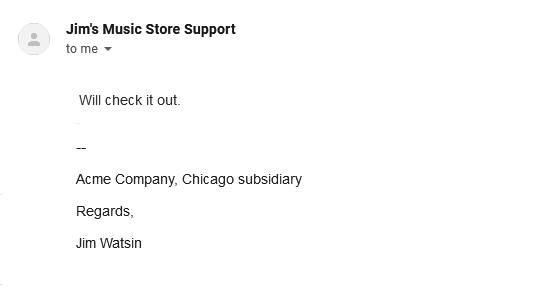Helprace placeholder guide
Placeholders are commands that refer to ticket properties in email messages, rules and more. Without the use of placeholders, it would be impossible to send email notifications.
Here's where you can use placeholders:
- Instant rules. Learn more
- Time based rules. Learn more
- Macros (canned replies). Learn more
- Custom static app. Learn more
- When replying or leaving an internal note to a ticket
Tickets
|
Placeholder |
Description |
{$ticket.title}
|
Ticket subject |
{$ticket.tags} |
Ticket tags |
{$ticket.description}
|
The last ticket message, without any formatting (see below for more examples) |
|
Full URL path to ticket for Agents (in the admin panel) |
|
Full URL path to the ticket for Users (in the user portal) |
{$ticket.id}
|
Unique ticket ID |
{$ticket.via}
|
Source of ticket (email, user-portal, admin-panel, feedback-widget, or api). |
{$ticket.status}
|
Ticket status (New, Open, Pending, On-Hold, Solved) |
{$ticket.priority}
|
Ticket priority (Low, Normal, High, Urgent) |
{$ticket.ticket_type}
|
Ticket type (Question, Incident, Problem, Task) |
{$ticket.comments} |
All ticket messages, normal text, latest first |
Ticket info
Allows you to display additional ticket information to your agents, including: priority, user group, custom fields, & a link to ticket in the admin panel:
{$ticket.info}

Ticket time
Time will be returned in UTC:
| Placeholder | Description |
{$ticket.created_at} |
Time when ticket was created |
{$ticket.created_at_with_timestamp} |
Timestamp when ticket was created |
{$ticket.updated_at} |
Time when ticket was updated |
{$ticket.updated_at_with_timestamp} |
Timestamp when ticket was updated |
Ticket fields
| Placeholder | Description |
|
Lists all fields with values selected. Only fields visible to user will be shown |
{$ticket.fields.ID.name} |
Name of field corresponding to its ID number (see Settings > Fields). Only fields visible to user will be shown |
{$ticket.fields.ID.value} |
Value of field corresponding to its ID number (see Settings > Fields). Only fields visible to user will be shown |
Ticket teams, groups, organizations
| Placeholder | Description |
{$ticket.team} |
Team ticket is assigned to |
{$ticket.requester.organization} |
Organization the User creating or submitting the ticket belongs to |
{$ticket.requester.groups} |
User Groups the User creating or submitting the ticket belong to, separated by commas |
{$ticket.requester.teams} |
Team the Agent creating or submitting the ticket belongs to |
{$ticket.assignee.teams} |
Team the Agent assigned to ticket belongs to |
{$current_user.organization} |
Organization of User currently updating the ticket |
{$current_user.groups} |
User Groups of User currently updating the ticket, separated by commas |
{$current_user.teams} |
|
Satisfaction ratings
| Placeholder | Description |
|
Returns 1 if a request to rate the ticket satisfaction has been sent or 0 if not |
|
Formatted links (Good, Bad) asking users to rate support |
|
Satisfaction rating (Good, Bad) |
|
Text of satisfaction rating comment |
|
Link to rates support positively |
|
Link to rates support negatively |
|
Link to rate support |
Ticket users
|
Placeholder |
Description |
{$ticket.account}
|
Your account name (subdomain) |
{$ticket.assignee.name}
|
Full name of Agent assigned to the ticket, if any |
{$ticket.assignee.first_name}
|
First name of Agent assigned to the ticket, if any |
{$ticket.assignee.last_name}
|
Last name of Agent assigned to the ticket, if any |
{$ticket.requester.name}
|
Full name of User or Agent creating or submitting the ticket |
{$ticket.requester.first_name}
|
First name of User or Agent creating or submitting the ticket |
{$ticket.requester.last_name}
|
Last name of User or Agent creating or submitting the ticket |
{$ticket.requester.email}
|
Email of User or Agent creating or submitting the ticket |
{$ticket.submitter}
|
Name of User submitting the ticket |
{$ticket.ccs}
|
Ticket CCs |
{$ticket.cc_names} |
Names of ticket CCs |
{$ticket.cc_emails}
|
Emails of ticket CCs |
{$current_user.name}
|
Full name of User or Agent updating the ticket |
{$current_user.first_name}
|
First name of User or Agent updating the ticket |
{$current_user.last_name}
|
Last name of User or Agent updating the ticket |
{$current_user.role}
|
Role of User or Agent currently updating the ticket |
{$current_user.extended_role}
|
The precise role of staff member currently updating the ticket (ie, Admin, Owner) |
{$current_user.id}
|
ID of User or Agen currently updating the ticket |
{$current_user.email}
|
Email of User or Agent currently updating the ticket |
Ticket comments
Ticket messages are added to tickets as a separate object. This is used in email replies.
All comments
Note: Internal notes will be sent if requester is an Agent.
Last message, no formatting:
{$ticket.description}

All messages, normal text, latest first:
{$ticket.comments}

All messages, formatted, latest first:
{$ticket.comments_formatted}

Last message, normal text:
{$ticket.latest_comment}

Last message, formatted text:
{$ticket.latest_comment_formatted}

All messages except latest message, normal text, latest first:
{$ticket.history}
All messages except latest message, formatted text, latest first:
{$ticket.history_formatted}
All public comments
Note: Internal notes will not be sent
All messages, normal text, latest first:
{$ticket.public_comments}
All messages, formatted, latest first:
{$ticket.public_comment_formatted}
Last message, normal text:
{$ticket.latest_public_comment}
Last message, formatted text:
{$ticket.latest_public_comment_formatted}
Message after latest message, normal text:
{$ticket.previous_public_comment}
Message after latest message, formatted text:
{$ticket.previous_public_comment_formatted}